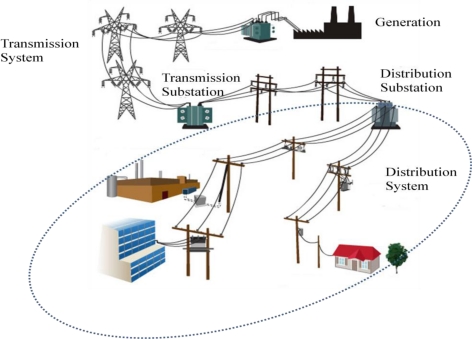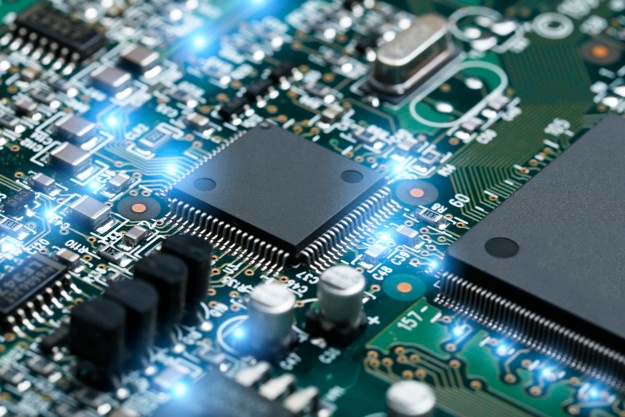
Have you ever confused between electrical and electronics engineering?
What exactly is the difference between Electrical and Electronics engineering?
After my schooling, when it was time to take the engineering admission, I asked the same question to myself.
Now, I have completed my master’s graduation in electrical engineering. I think I’m very much eligible to answer your query.
I will explain electrical and electronic circuits, devices, and their functionalities.
Let’s see the detail description, differences, and similarities in electrical and electronics.
Table of Contents
Difference between Electrical and Electronics
Let’s study electrical and electronics by comparing with one with another.
| # | Content | Electrical | Electronics |
| 01 | Definition | Electrical technology deals with the generation, distribution, storage, and conversion of electrical energy/power, etc. | Electronic technology deals with designing, amplifying, and switching electrical energy with the help of different electronics equipment. |
| 02 | Fundamental Role | In the electrical circuit, electrical energy consists of the flow of electron. | In the electronic circuit, the energy consists of the flow of electron and hole. |
| 03 | Device Principle (Voltage & Current) | The electrical devices produce the voltage and current. | Electronic devices control the voltage and current. |
| 04 | Current Function(AC & DC) | It works on Alternating Current (AC). The AC power may be a single-phase or three phases (220V/440V) in the ‘V’ to ‘kV’ range. | Only the Direct Current (DC) work on it. The range of the voltage is ‘mV’ to ‘V’. The general rating of the voltage is 5V,12V,24V, etc. |
| 05 | Conducting Material | In the electrical environment, the conductor is used. Copper (Cu) and Aluminum(Al) are the best conductors. |
Only the semiconductor is used in the electronic circuit. Example: Silicon (Si), Germanium (Ge), etc. |
| 06 | Specification of Component | It consists of passive components. Example: Resistor, capacitor, and inductor. |
It consists of active components. Diode, transistor, oscillator are the best example of active components. |
| 07 | Function | They cannot manipulate data. | It manipulates the data to assign. |
| 08 | Electrical Power | In the electrical circuit, the role is to monitor or control the high electrical power. | An electronic circuit monitors or controls low power. |
| 09 | Decision-Making Device | This electrical device cannot make a decision. Example: The electrical bulb cannot make a decision. |
This device easily can make a decision. The best example of an electronic device is Mobile. It can get a quick decision. |
| 10 | Energy Conversation | Electrical energy converts into other forms of energy i.e heat, motion, or light. | It does not convert into other forms. |
| 11 | Size | Electrical devices occupy a large size and required more space. | Electronic devices occurred in small sizes. You can easily transport the electronic circuit/pieces of equipment. |
| 12 | Example | Transformer, Alternator Motor and Generator, Fuse, Circuit breaker and etc. are the example of electrical devices. | Diode, Transistor, Thyristor, Microcontroller, etc. are the example of electronic devices. |
13. Electrical and Electronic System
Electrical System:
In the electrical system network, electrical power is transmitting from generation to distribution system with their different types of equipment.
You can see the following network of an electrical system.

Electrical System
Electronic System:
In this below picture, we are looking at the different kinds of electronic equipment.

Electronic System
I hope the difference between electrical and electronic is clear with those 13 points. I have explained the different kinds of functions, aspects, working role, device energy/power role, etc in detail.
What is the Difference Between Electrical and Electronics devices?
The most dominant difference between both is, electrical devices convert electrical energy into another form of energy like heat, light, sound, etc.
An electronic device performs control/switching operation of electrical energy for the particular task.
Similarity between Electrical and Electronics Circuits
- Technically, the electrical and electronic devices both require a flow of electrons for the circuit operation.
- In both, electrical and electronic circuits, the transformer is used for transmitting the voltage.
What’s Next?
Read more differences for a deeper understanding.
- Classification of Transformer
- Resistance Vs Reactance
- Capacitance Vs Inductance
- Conductor Vs Insulator
- Series Vs Parallel Circuit
- MCB Vs MCCB
- Electrical Vs Magnetic circuit
- Electrical & Electronic Project
This is all about the difference between electrical and electronics engineering.
If you are looking for admission in electrical or electronics engineering, or if you are looking for a job, understand the difference between the two engineering fields. Find out what holds your interest more and choose wisely.
If you have any points to discuss or queries to ask, you can share in the comment.
Thanks for Reading!
Thanks for the sharing this kind of knowledge
Welcome, Shivaraj Duddagi! I’m happy to share this knowledge.
Thanks
Found helpful. Thanks for sharing.
Thank you, Swapnil
Thanks, Dipali. It’s a good theme and a good website
Thank you so much, Sir, for appreciation to my blog.
Why this education system is different and complex? Your explanation cleared my view after 8 yrs of my degree completion in EEE. I hate these teachers who failed to educate me and my fellow colleagues. I’m from Tamil Nadu. Here engineering has become marketing. No one cares about students life. Thank you for sharing this simple and clear explanation.
Hi Arun,
Discussing the eduction system in India is a never-ending topic. I’m glad hearing your thoughts and opinion about our education system.
I’m also happy as you find this tutorial simple and clear. Hope you enjoy reading other tutorials as well. I will try my best to keep the same harmony- simple and clear.
Thank you for creating this blog. It was very helpful to me. Just, I addicted my self to this blog!
Thank you so much.
It is very helpful.
Most welcome:)
When same one need to sturdy in India what can help you?
Thank you, Dipali
You are most welcome 🙂
Hi dipali my name is Joseph I study in Rwanda in electrical and electronics engineering I want to sturdy in India what can help me?
Well explained.
Thank you for making it sharing worth.
Glad 🙂
Thanks for the clarity, Dipali.
Glad 🙂
Hi Dipali. My daughter wants to take electronics and electrical. Is it useful for the future.
Hi Ma’am! Electronics and electrical is a good engineering stream, indeed. There are a lot of PSUs and private core companies out there for electronics and electrical engineers to join. Bright scholars have good future in this field.
Thank you, so much for your explanations and teaching. I have added something new. Thank you!
You are most welcome, Phinoz. If you have any points, you can share it.
Hi Dipali,
It’s really useful for me. I too have this doubt. Your explanation was awesome Dipali. It would be grateful if you could give more basics tutorial.
Thank you, Bhuvi:)
Sure, I will explain all the basic electrical tutorials.
Very nice described.
Thanks, Malaya 🙂
Two most important points, which you can share.
Electrical- Production
Electronics- Controller
Electrical- AC
Electronics- DC
Thanks, Ravikishan 🙂
Sure, I will add these two points.
Hi Dipali, Nice explanation.
I have a concern about the voltage rating of the electronic elements. For the HVDC application, the power rating would be in KW/MW.
Thank you 🙂
Thanks, Wudineh for reaching out to my portal. Really, you are made my day.
Thanks for good and quality description,.
Glad 🙂
Is this will be useful for electronics and communication engineering students?
Yes. It is the most fundamental and important concept for electrical, electronics, and communication engineering. So, we should familiar with all these differences.
Good Interactions. This will really be useful.
Thanks, John.
Very helpful! Thank you for sharing your knowledge.
I’m glad to share with DipsLab readers like you.
It is very clear and nice explanation for me. Thanks for the posting!
Good and easy explanation.
Thank you, Ma’am.
Thanks, Siddharth for commenting.
Thank you for such a brief discussion
Nice blogs, I work in VLSI -DFT, if you need any input for the VLSI then feel free to message me
Thanks, Vinod.
Thank you so much! I’m really glad you liked the blogs.
Glad. You find it helpful.
Thanks, Dipali! God bless you!
You’re welcome 🙂
I am confused with selecting a mini project in electrical. Could you help me, please?
Hi Tataji, I have listed some electrical & electronics projects. Please check it, hope you will get it.
I am fully satisfied reading this article. Thanks so much, Dipali Chaudhari ma’am
You’re welcome.